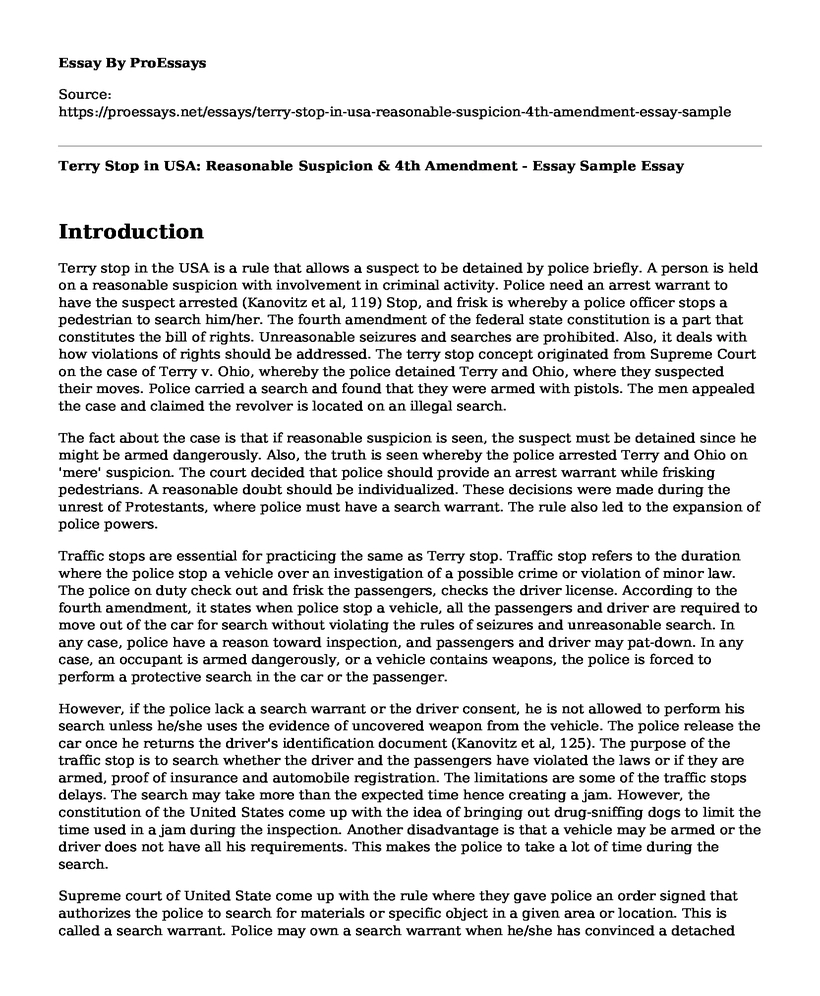Introduction
Terry stop in the USA is a rule that allows a suspect to be detained by police briefly. A person is held on a reasonable suspicion with involvement in criminal activity. Police need an arrest warrant to have the suspect arrested (Kanovitz et al, 119) Stop, and frisk is whereby a police officer stops a pedestrian to search him/her. The fourth amendment of the federal state constitution is a part that constitutes the bill of rights. Unreasonable seizures and searches are prohibited. Also, it deals with how violations of rights should be addressed. The terry stop concept originated from Supreme Court on the case of Terry v. Ohio, whereby the police detained Terry and Ohio, where they suspected their moves. Police carried a search and found that they were armed with pistols. The men appealed the case and claimed the revolver is located on an illegal search.
The fact about the case is that if reasonable suspicion is seen, the suspect must be detained since he might be armed dangerously. Also, the truth is seen whereby the police arrested Terry and Ohio on 'mere' suspicion. The court decided that police should provide an arrest warrant while frisking pedestrians. A reasonable doubt should be individualized. These decisions were made during the unrest of Protestants, where police must have a search warrant. The rule also led to the expansion of police powers.
Traffic stops are essential for practicing the same as Terry stop. Traffic stop refers to the duration where the police stop a vehicle over an investigation of a possible crime or violation of minor law. The police on duty check out and frisk the passengers, checks the driver license. According to the fourth amendment, it states when police stop a vehicle, all the passengers and driver are required to move out of the car for search without violating the rules of seizures and unreasonable search. In any case, police have a reason toward inspection, and passengers and driver may pat-down. In any case, an occupant is armed dangerously, or a vehicle contains weapons, the police is forced to perform a protective search in the car or the passenger.
However, if the police lack a search warrant or the driver consent, he is not allowed to perform his search unless he/she uses the evidence of uncovered weapon from the vehicle. The police release the car once he returns the driver's identification document (Kanovitz et al, 125). The purpose of the traffic stop is to search whether the driver and the passengers have violated the laws or if they are armed, proof of insurance and automobile registration. The limitations are some of the traffic stops delays. The search may take more than the expected time hence creating a jam. However, the constitution of the United States come up with the idea of bringing out drug-sniffing dogs to limit the time used in a jam during the inspection. Another disadvantage is that a vehicle may be armed or the driver does not have all his requirements. This makes the police to take a lot of time during the search.
Supreme court of United State come up with the rule where they gave police an order signed that authorizes the police to search for materials or specific object in a given area or location. This is called a search warrant. Police may own a search warrant when he/she has convinced a detached magistrate that there is a criminal activity that is occurring or a shred of crime evidence may be found there. The police are required to provide a written document to the magistrate containing the information under oath known as 'affidavits.' The report includes its observation or police informants (Kanovitz et al, 150). The magistrate offers the search warrant if he or she thinks to believe the affidavit is reasonable.
When the police are given a search warrant, he is only allowed to search where the place where the permit describes. An example they cannot search for marijuana if the order specifies weapons. There are exceptional cases whereby an arrest can be made without a search warrant. Supreme Court defined some situations when a search warrant is not needed. When a person voluntarily agrees for a search, when the police officer is at the spot where there is evidence.
The officer does not also need a search warrant where the connection is made with an arrest. Also, the emergency exception does not require a search warrant, an example when patrols hear screams and in a drug arrest. Lastly, police can stop a person when he suspects him/her reasonably for criminal activity. To sum up, the stop and arrest laws have helped the police from harassing and violating the rights of a man. They have set ways on how, when, and where the searches are to be conducted.
Work Cited
Kanovitz, Jacqueline R et al. Constitutional Law For Justice.
Cite this page
Terry Stop in USA: Reasonable Suspicion & 4th Amendment - Essay Sample. (2023, Feb 16). Retrieved from https://proessays.net/essays/terry-stop-in-usa-reasonable-suspicion-4th-amendment-essay-sample
If you are the original author of this essay and no longer wish to have it published on the ProEssays website, please click below to request its removal:
- Diversion Programs Essay Example
- Essay Sample on Defense of Property
- Should Juveniles Receive Life Sentences and Tried as Adults - Essay Sample
- Is Poverty a Crime? Examining Barbara Ehrenreich's NYT Piece
- Essay Sample on Interoperability in Police, Fire, EMS: Need for Established Tech
- The Impact of IT: Cyber-Attack & Its Consequences - Research Paper
- Ex-Convicts Reentering Society: Challenges & Solutions - Essay Sample







